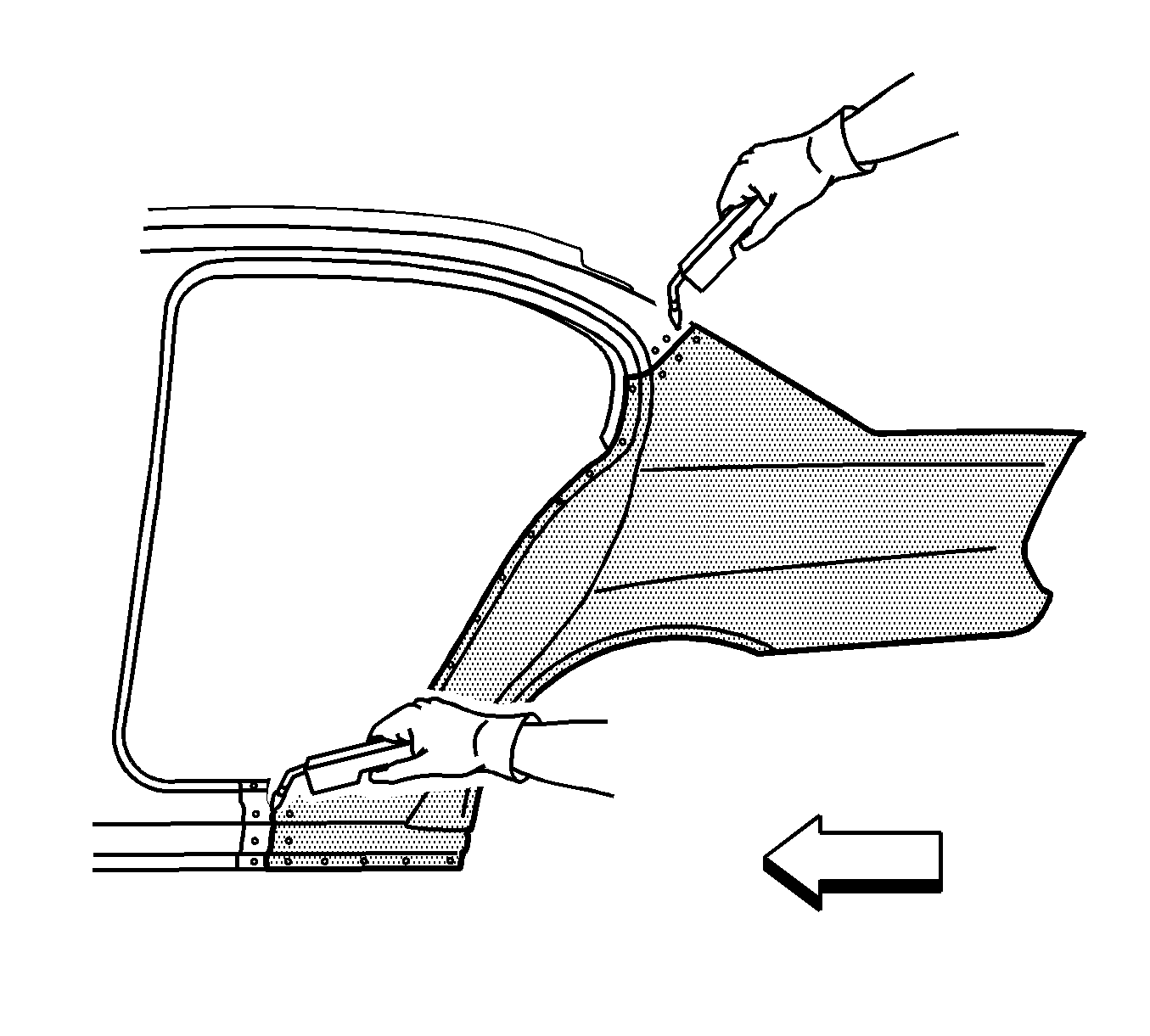Quarter Outer Panel Sectioning Sedan Bond-On
Removal Procedure
Caution: Refer to Approved Equipment for Collision Repair Caution in the Preface section.
Important: This adhesive bonding procedure repreents one manufacturer's installation application. Other manufacturers' procedures may vary, including MIG welding in some areas of the repair. Always follow the system manufacturer's instructions for application, handling, and curing.
Important: Before beginning the repair, refer to Metal Panel Bonding for proper adhesive preparations and general information.
- Disconnect the negative battery cable. Refer to Battery Negative Cable Disconnection and Connection in Engine Electrical.
- Disable the SIR system. Refer to SIR Disabling and Enabling in SIR.
- Restore as much of the damage as possible to factory specifications. Refer to Dimensions - Body .
- Remove all related panels and components.
- Note the location and remove the sealers and anti-corrosion materials from the repair area, as necessary. Refer to Anti-Corrosion Treatment and Repair in Paint and Coatings.
- Section the sail panel (a) and the rocker panel (b).
- Locate and drill out all factory welds. Note the number and location of welds for installation of the quarter panel.
- Cut the panel at the marked locations.
- Remove the lower quarter panel.
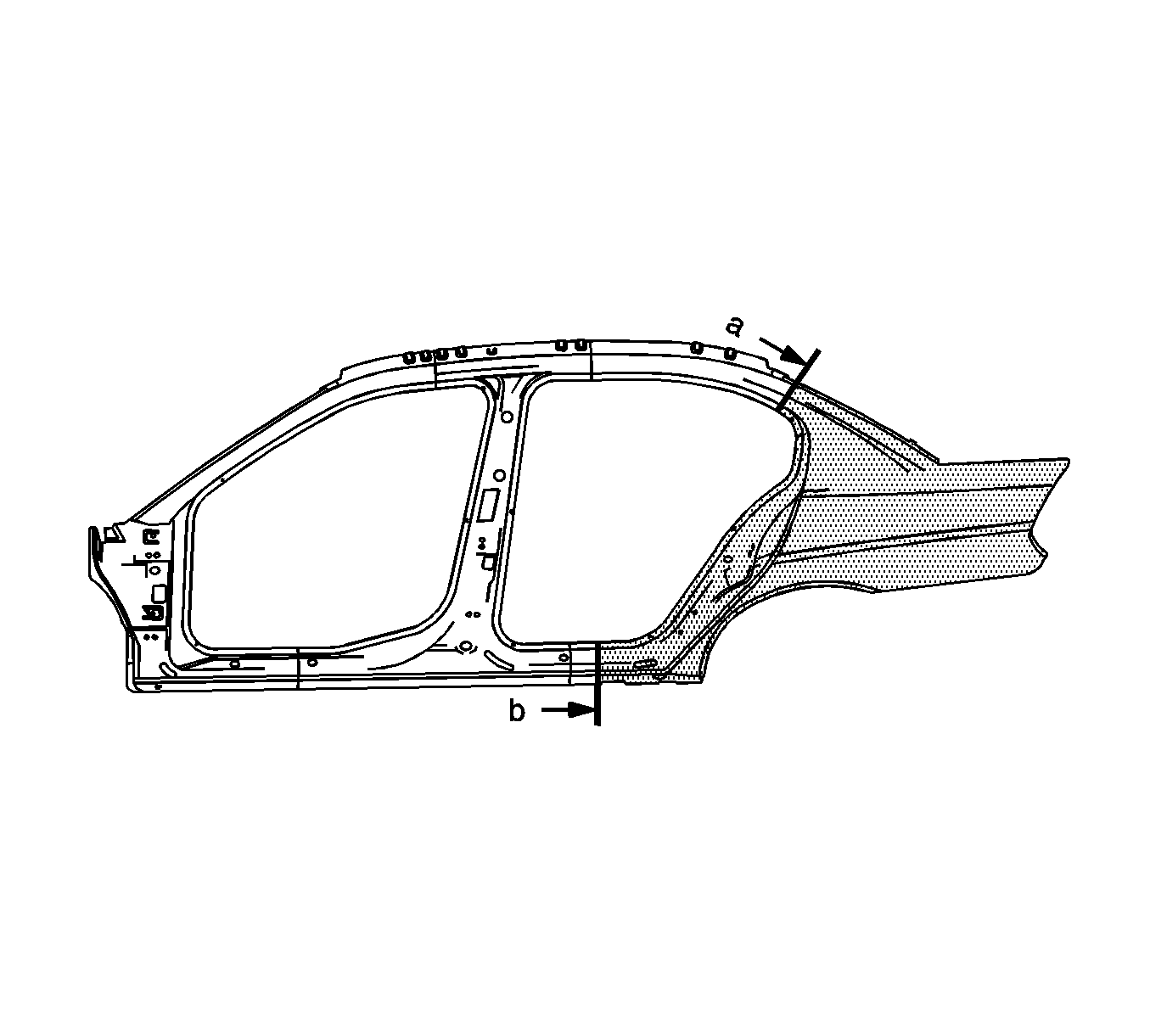
| • | At the sail panel, measure from the back glass opening down 120 mm (4 3/4 in). Scribe a line. |
| • | At the rocker panel, measure 70 mm (2 3/4 in) rearward from the rocker panel locating hole. Scribe a line. |
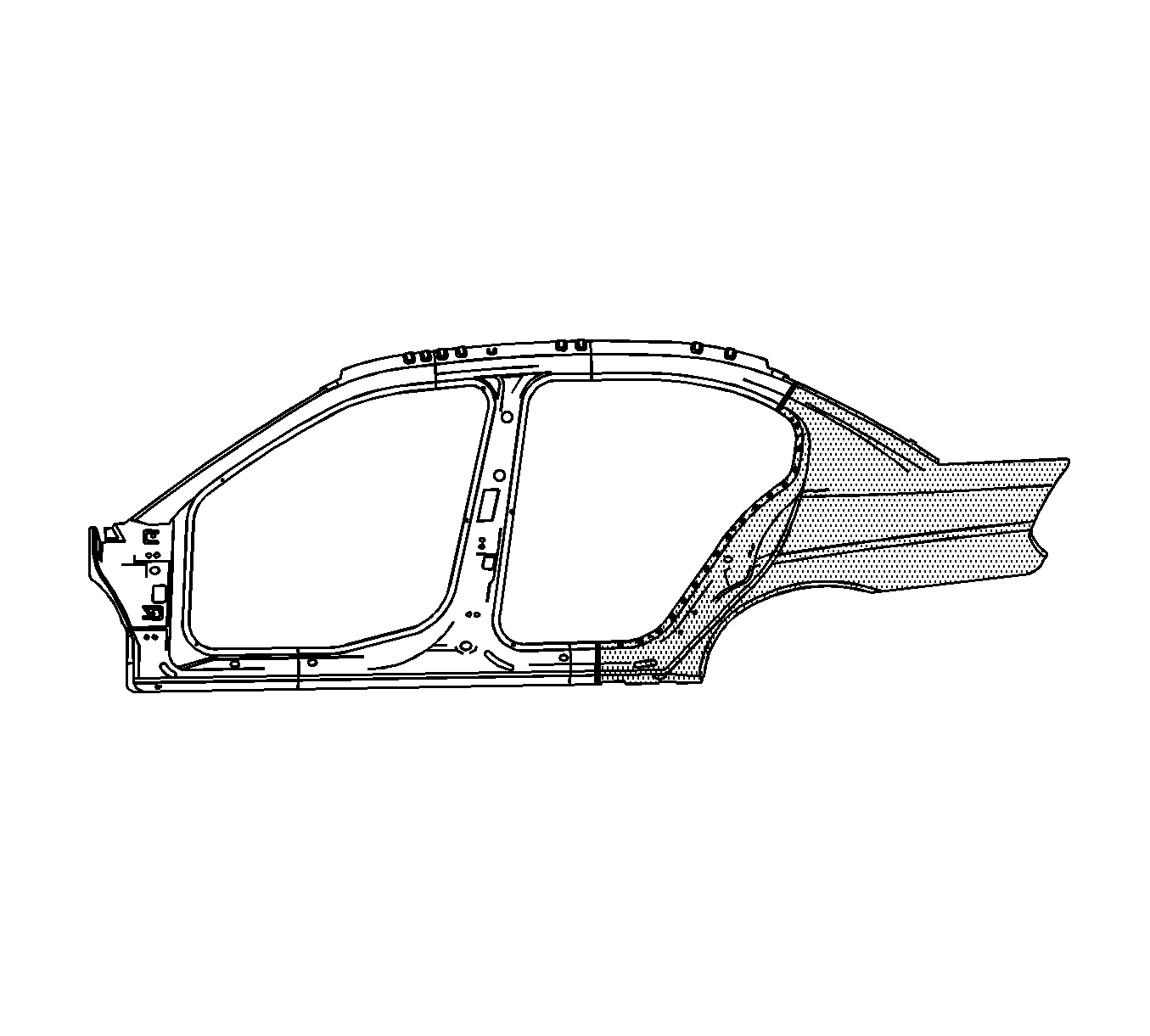
Important: Do not damage any other panel or reinforcements when cutting at the marked locations.
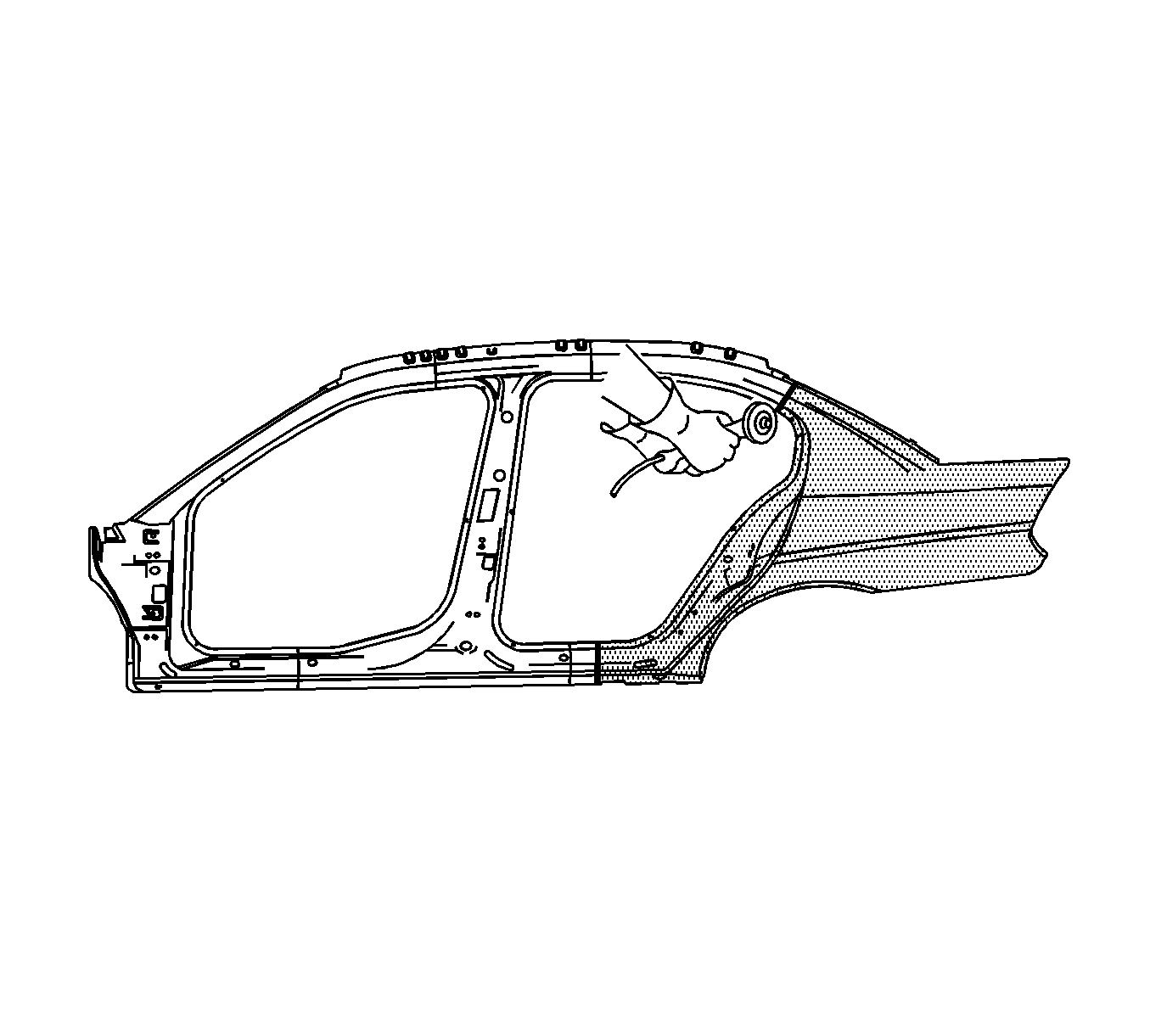
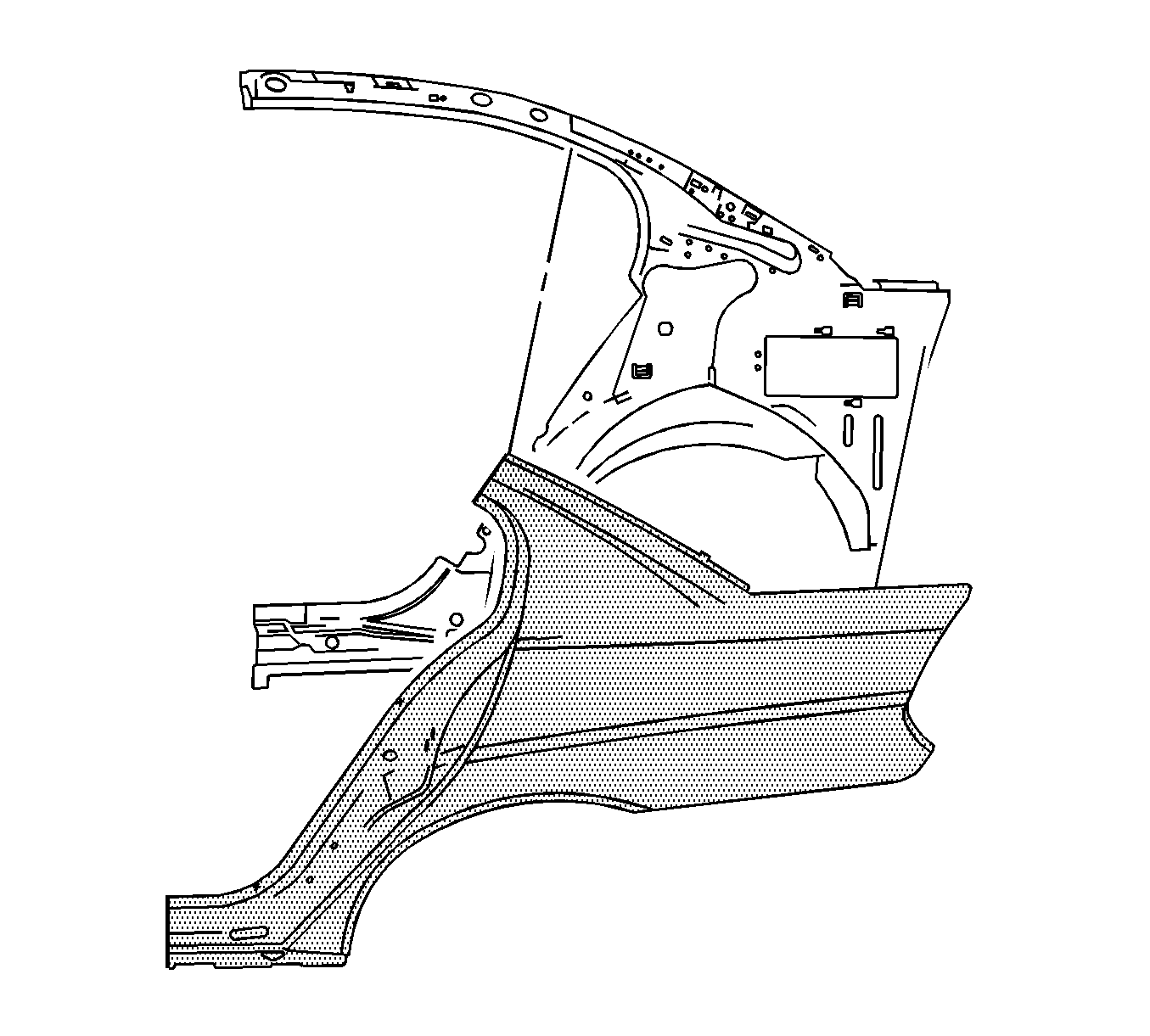
Installation Procedure
- Grind the surface of the body mating flanges to bare steel.
- Grind the quarter panel mating flanges to remove the E-coating. Take care not to damage the corners or thin the metal during the grinding operation.
- Clean the mating surfaces.
- Perform the sectioning procedure. Refer to Overlap/Backing Plate Sectioning .
- Apply a 3-6 mm (1/8-1/4 in) bead of metal panel bonding adhesive GM P/N 12378567 (Canadian P/N 88901675) or equivalent to both of the mating surfaces.
- Using a small acid brush, spread a coat of adhesive to cover all the bare metal surfaces to ensure corrosion protection.
- Apply a 9-13 mm (3/8-1/2 in) bead of metal panel bonding adhesive GM P/N 12378567 (Canadian P/N 88901675) or equivalent to the service part mating surface.
- Install the quarter panel to the body.
- Clamp the quarter panel into position as required.
- Using lacquer thinner remove the excess adhesive from the lower quarter panel area.
- Apply the sealers and anti-corrosion materials to the repair area, as necessary. Refer to Anti-Corrosion Treatment and Repair in Paint and Coatings.
- Paint the repair area. Refer to Basecoat/Clearcoat Paint Systems in Paint and Coatings.
- Install all related panels and components.
- Enable the SIR system. Refer to SIR Disabling and Enabling in SIR.
- Connect the negative battery cable. Refer to Battery Negative Cable Disconnection and Connection in Engine Electrical.
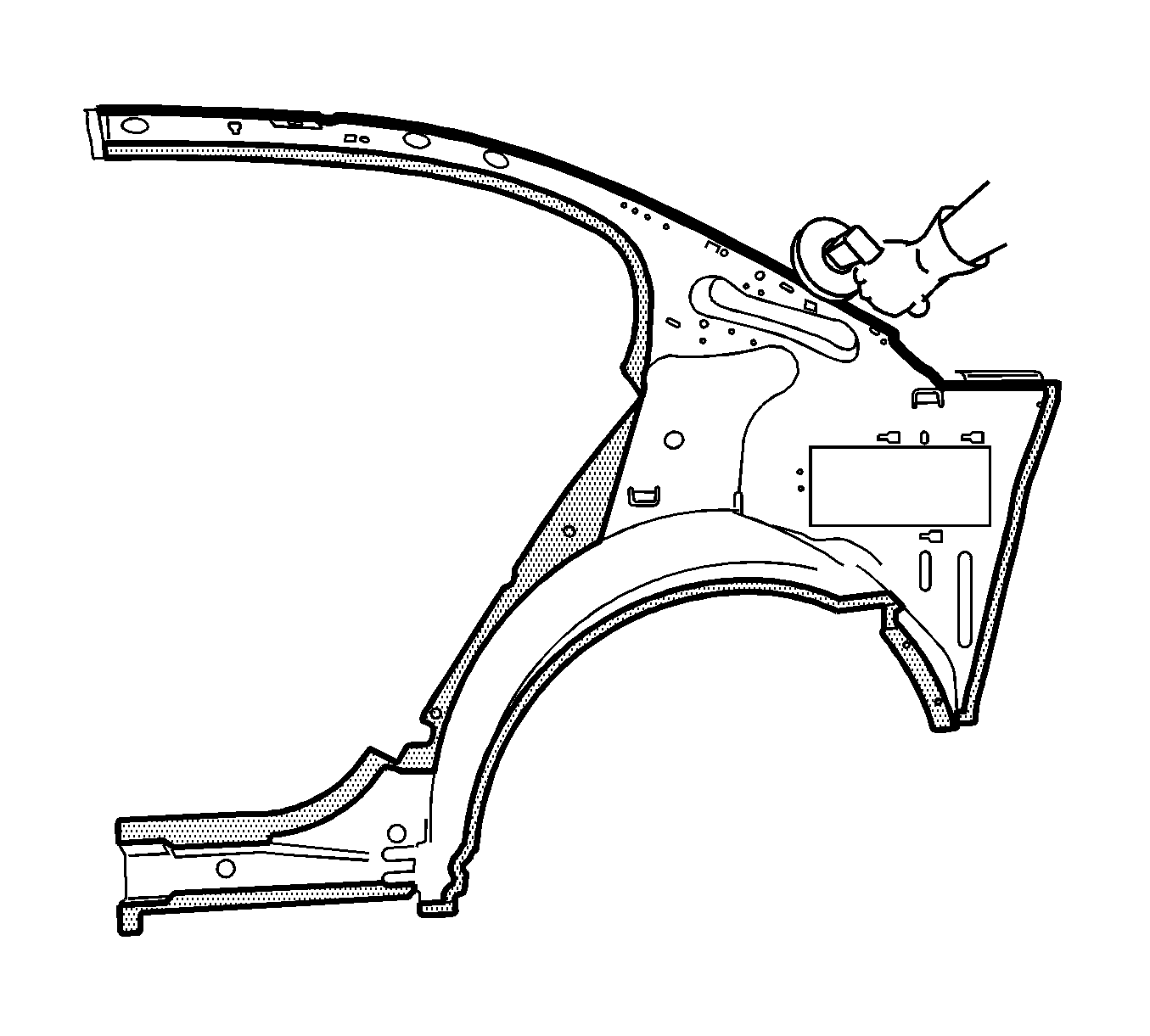
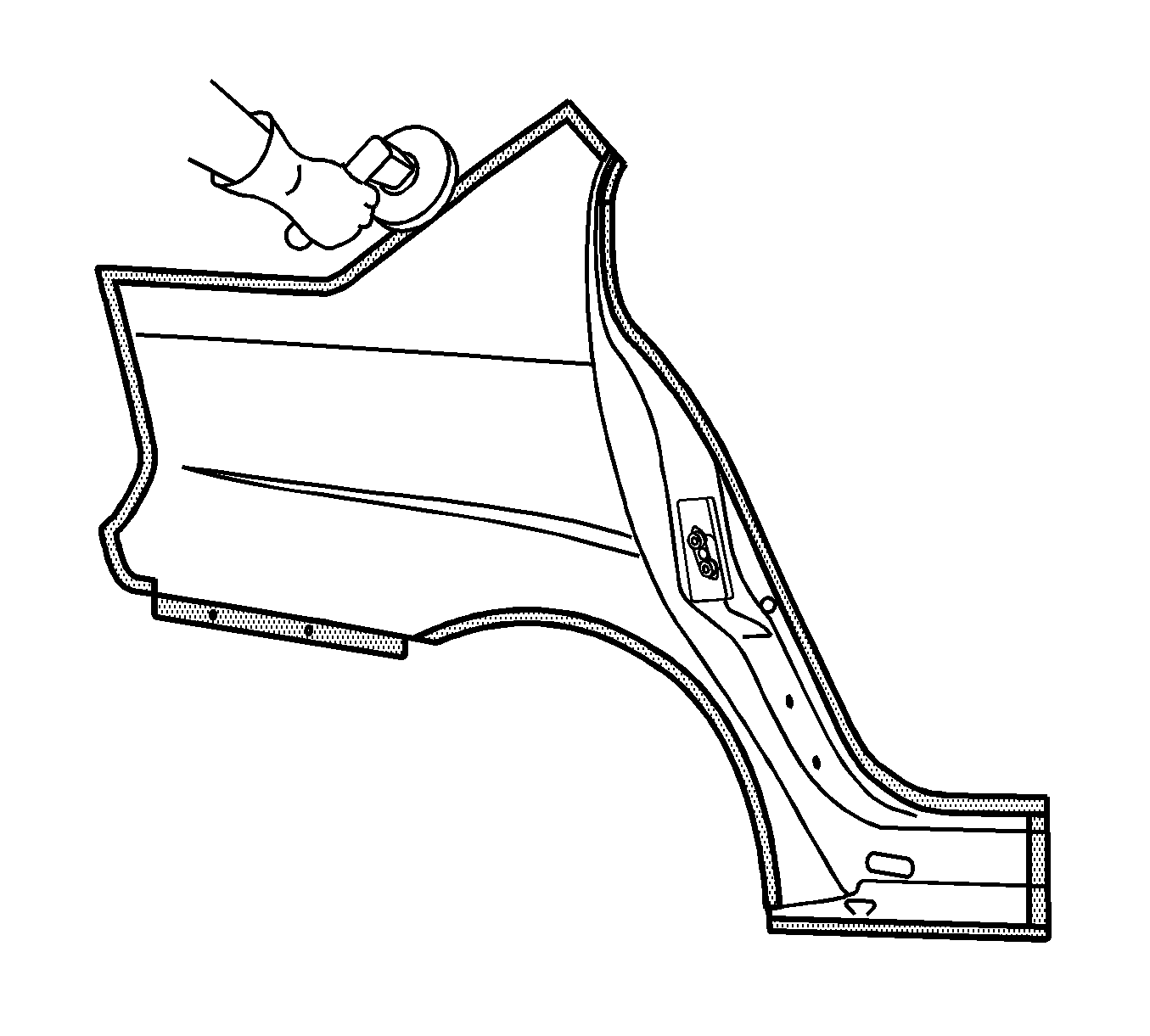
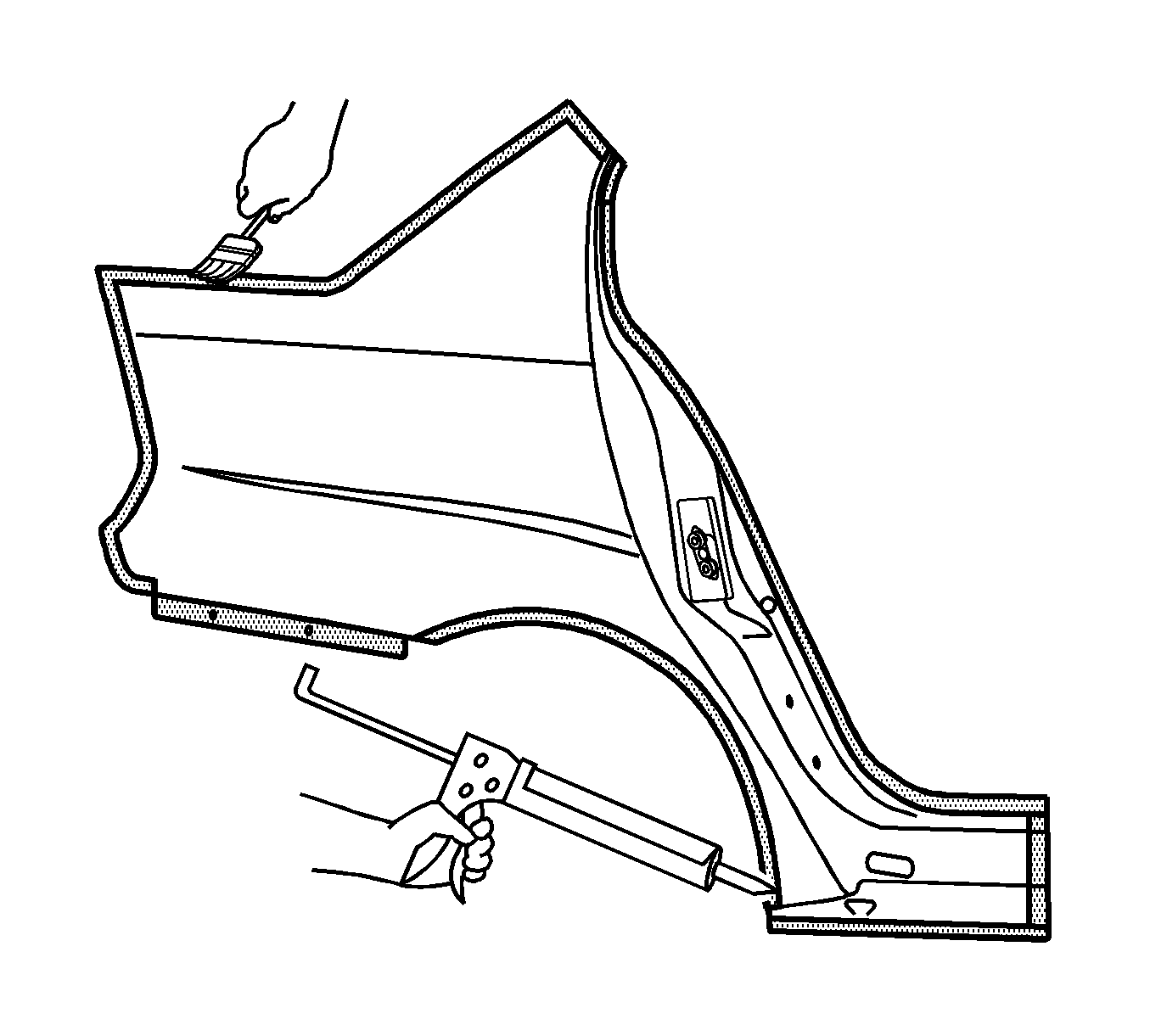
Important: The adhesive has a 40-50 minute working time. Do not allow the adhesive to totally cure off the vehicle, as proper alignment of the lower quarter panel to the body will be difficult.
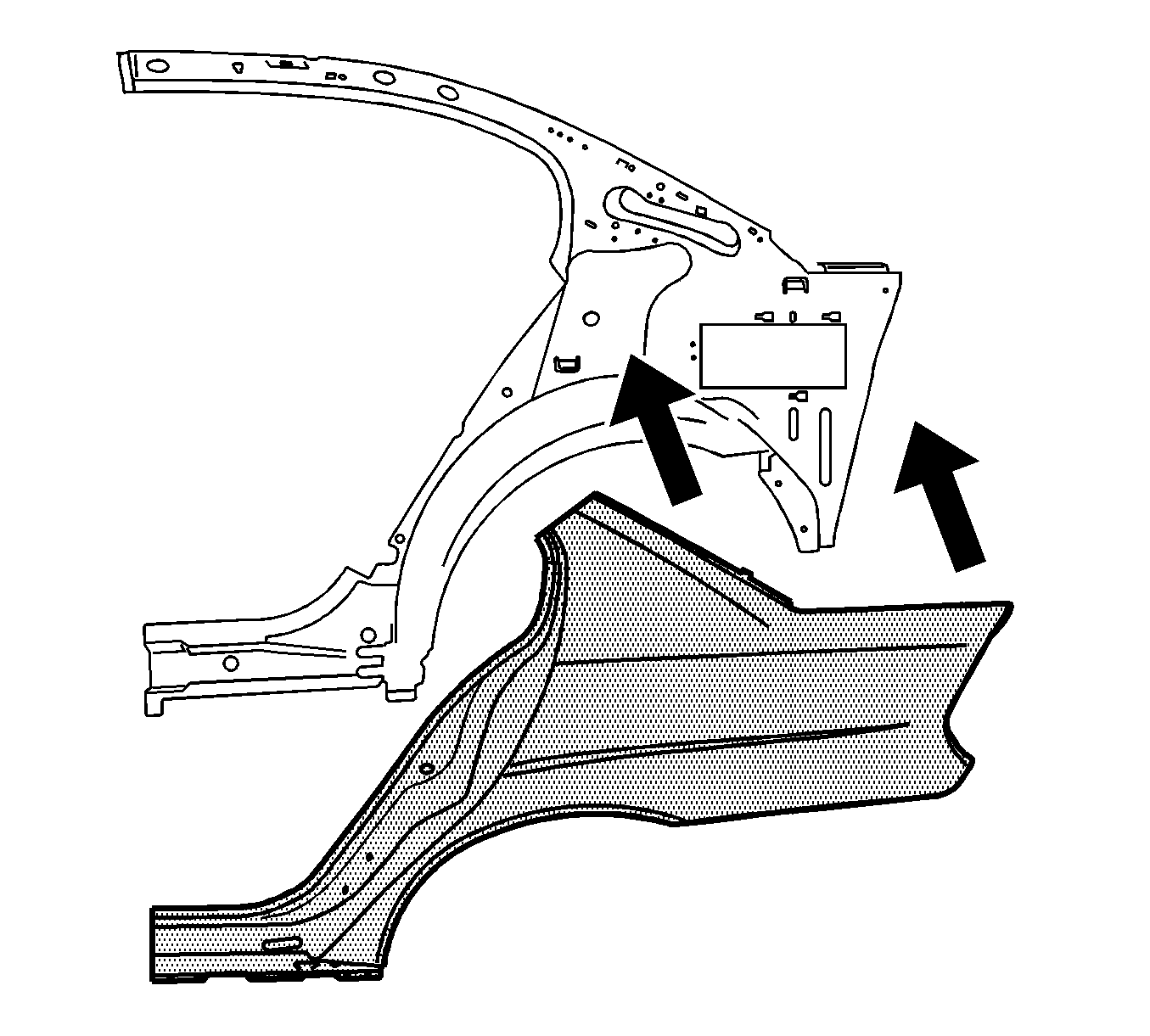
Important: DO NOT pull the panels apart after joined together. Slide the panels against each other to realign the panels.
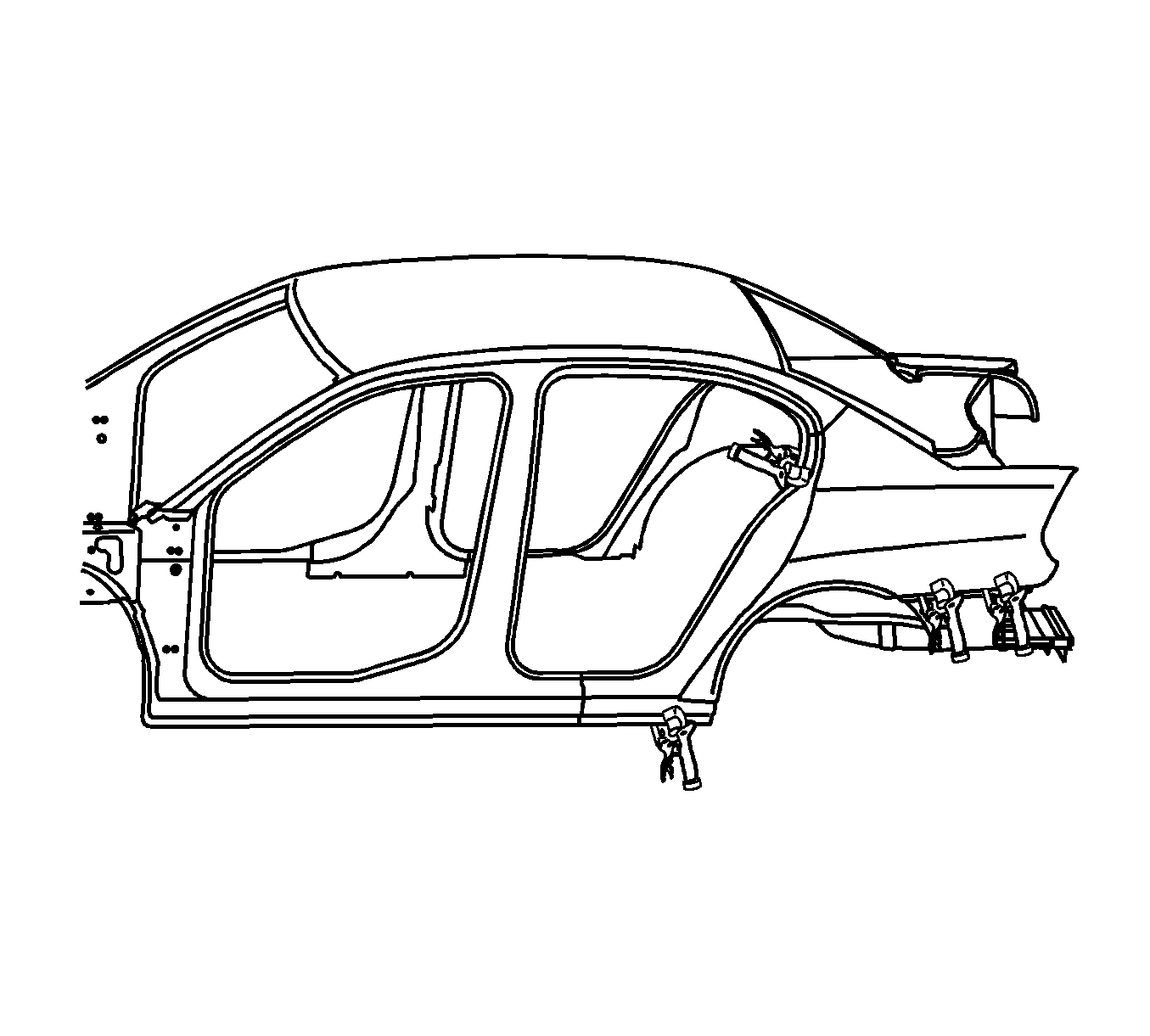
Quarter Outer Panel Sectioning Extended Sedan
Description
This repair procedure gives you the option of using an installation procedure for either metal-inert gas (MIG) welding or adhesive bonding. The choice of installation depends on the type of application requirements. The adhesive bonding procedure may also require MIG welding in some areas of the repair.
Removal Procedure
Caution: Refer to Approved Equipment for Collision Repair Caution in the Preface section.
Important: Before beginning the repair, refer to Metal Panel Bonding for proper adhesive preparations and general information.
- Disconnect the negative battery cable. Refer to Battery Negative Cable Disconnection and Connection in Engine Electrical.
- Disable the SIR system. Refer to SIR Disabling and Enabling in SIR.
- Restore as much of the damage as possible to factory specifications. Refer to Dimensions - Body .
- Remove all related panels and components.
- Note the location and remove the sealers and anti-corrosion materials from the repair area, as necessary. Refer to Anti-Corrosion Treatment and Repair in Paint and Coatings.
- Section the sail panel (a) and the rocker panel (b).
- Locate and drill out all factory welds. Note the number and location of welds for installation of the quarter panel.
- Cut the panel at the marked locations.
- Remove the lower quarter panel.
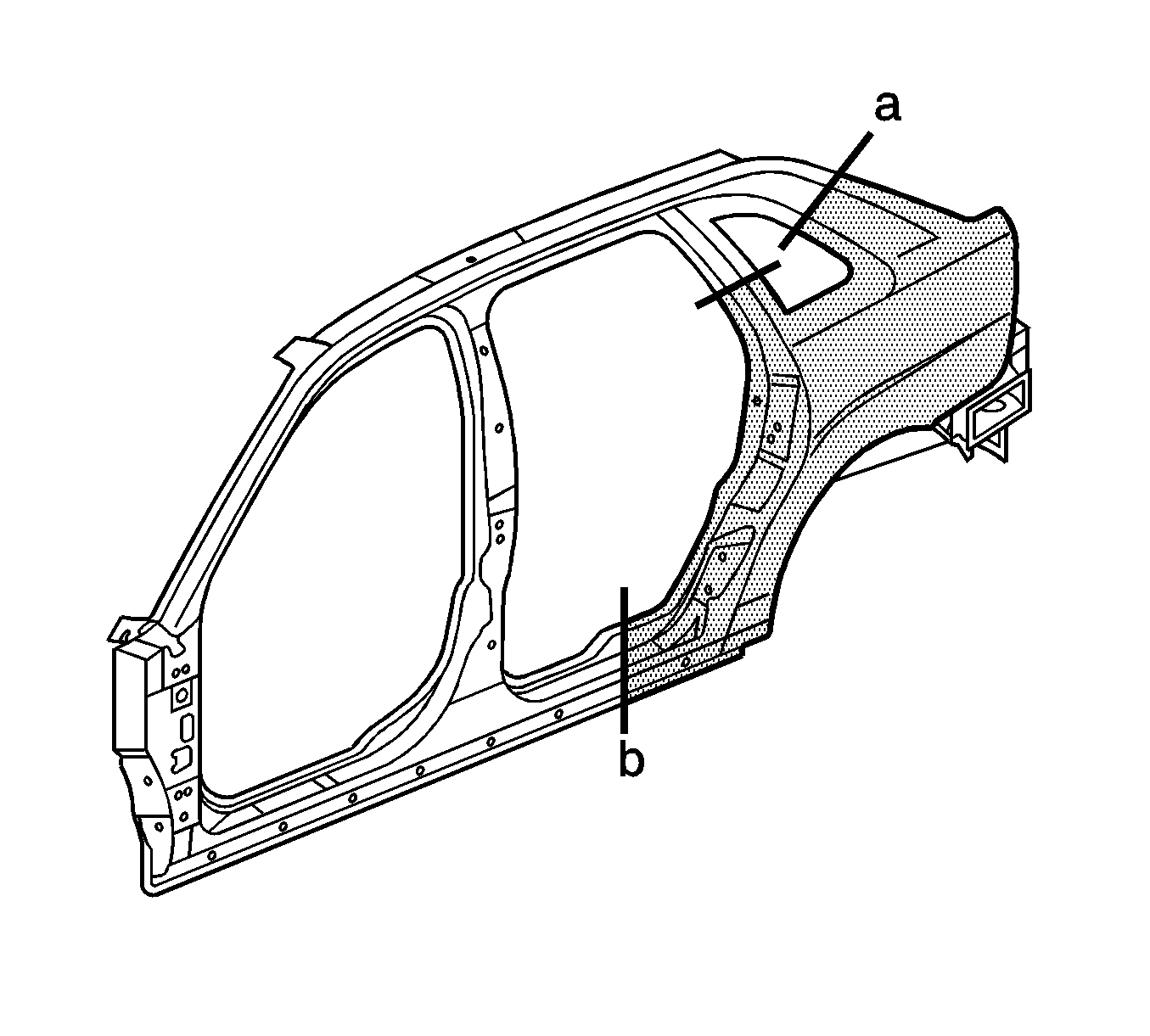
| • | At the sail panel, measure from the back glass opening down 120 mm (4 3/4 in). Scribe a line. |
| • | At the rocker panel, measure 70 mm (2 3/4 in) rearward from the rocker panel locating hole. Scribe a line. |
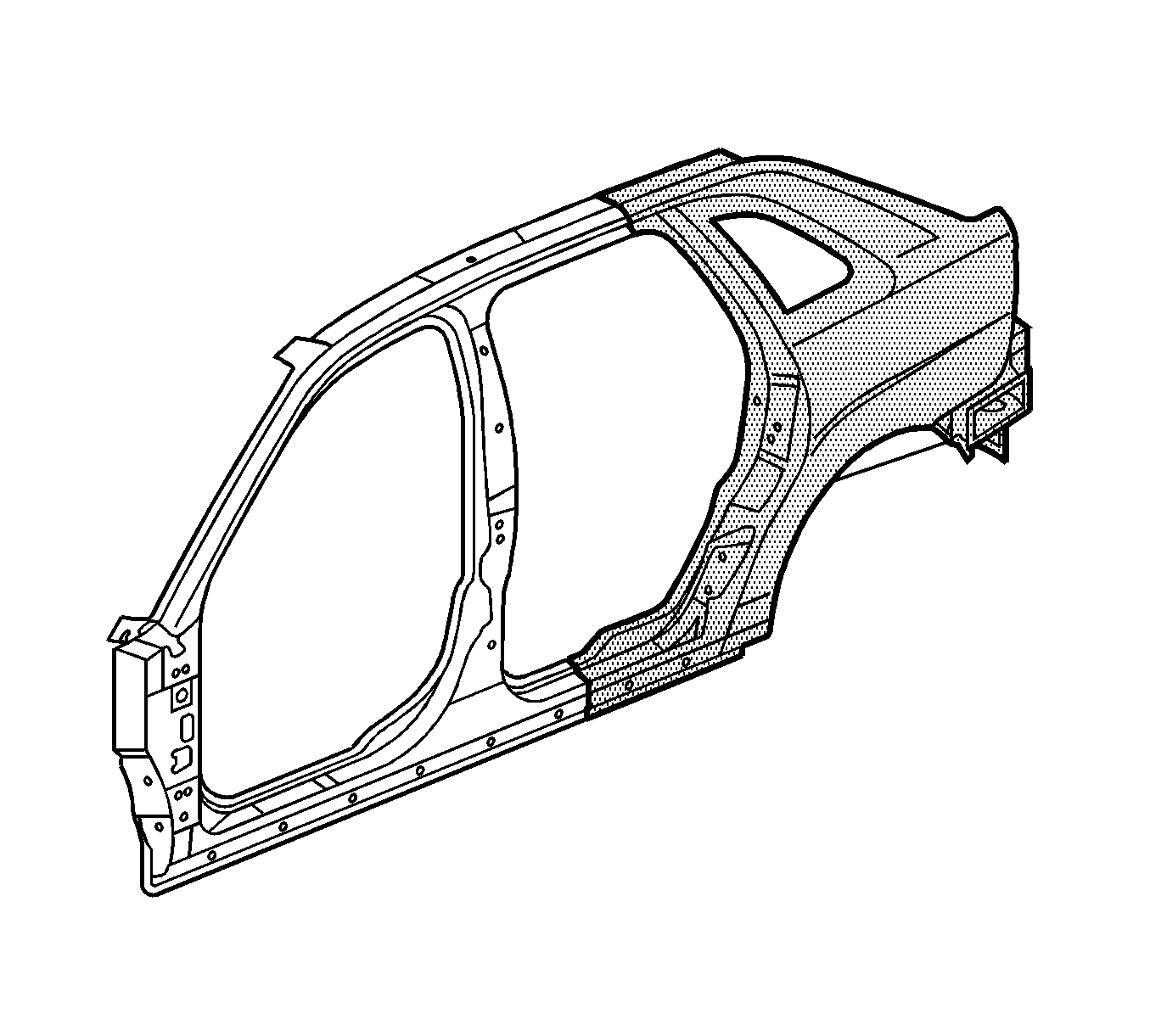
Important: Do not damage any other panel or reinforcements when cutting at the marked locations.
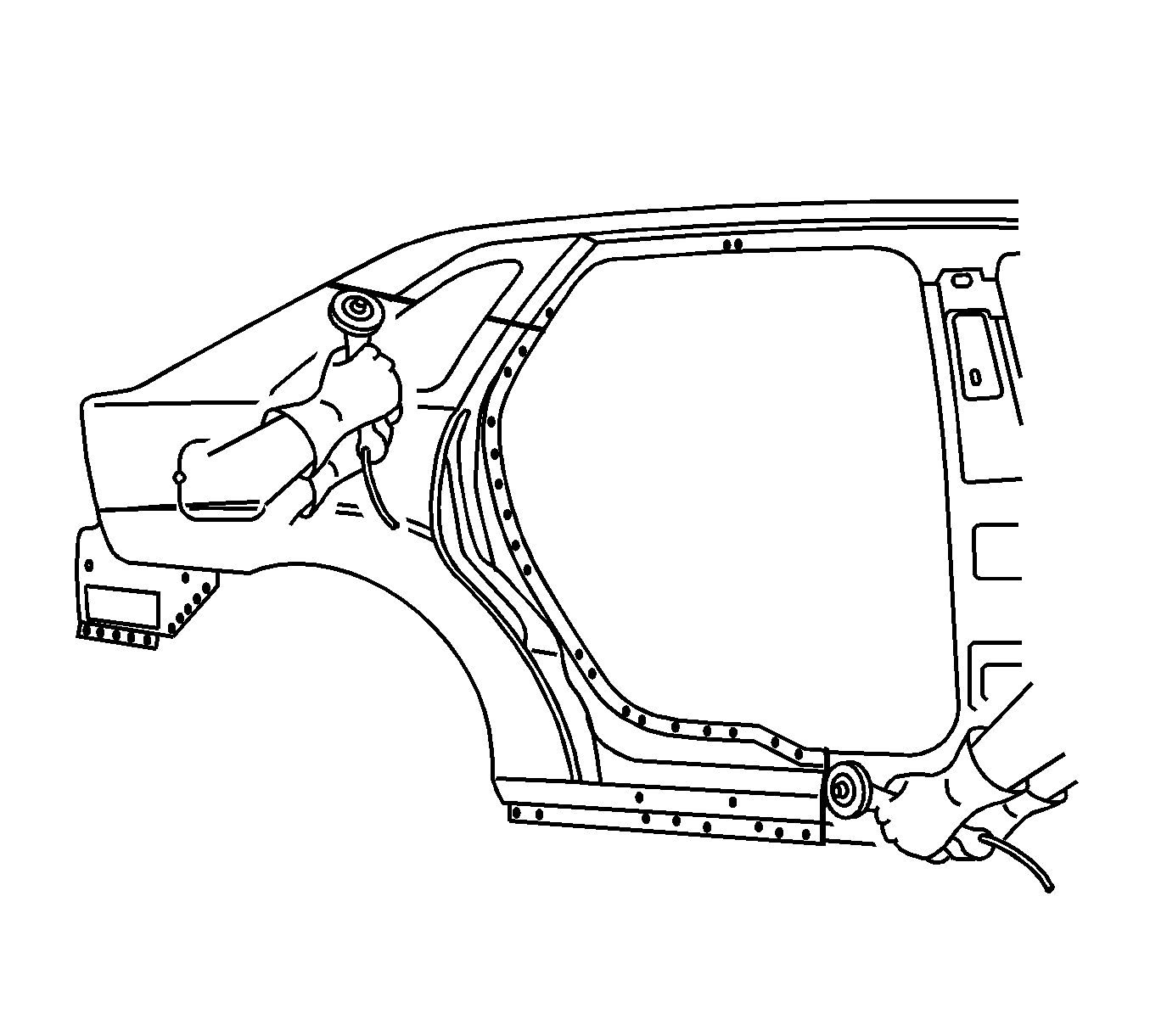
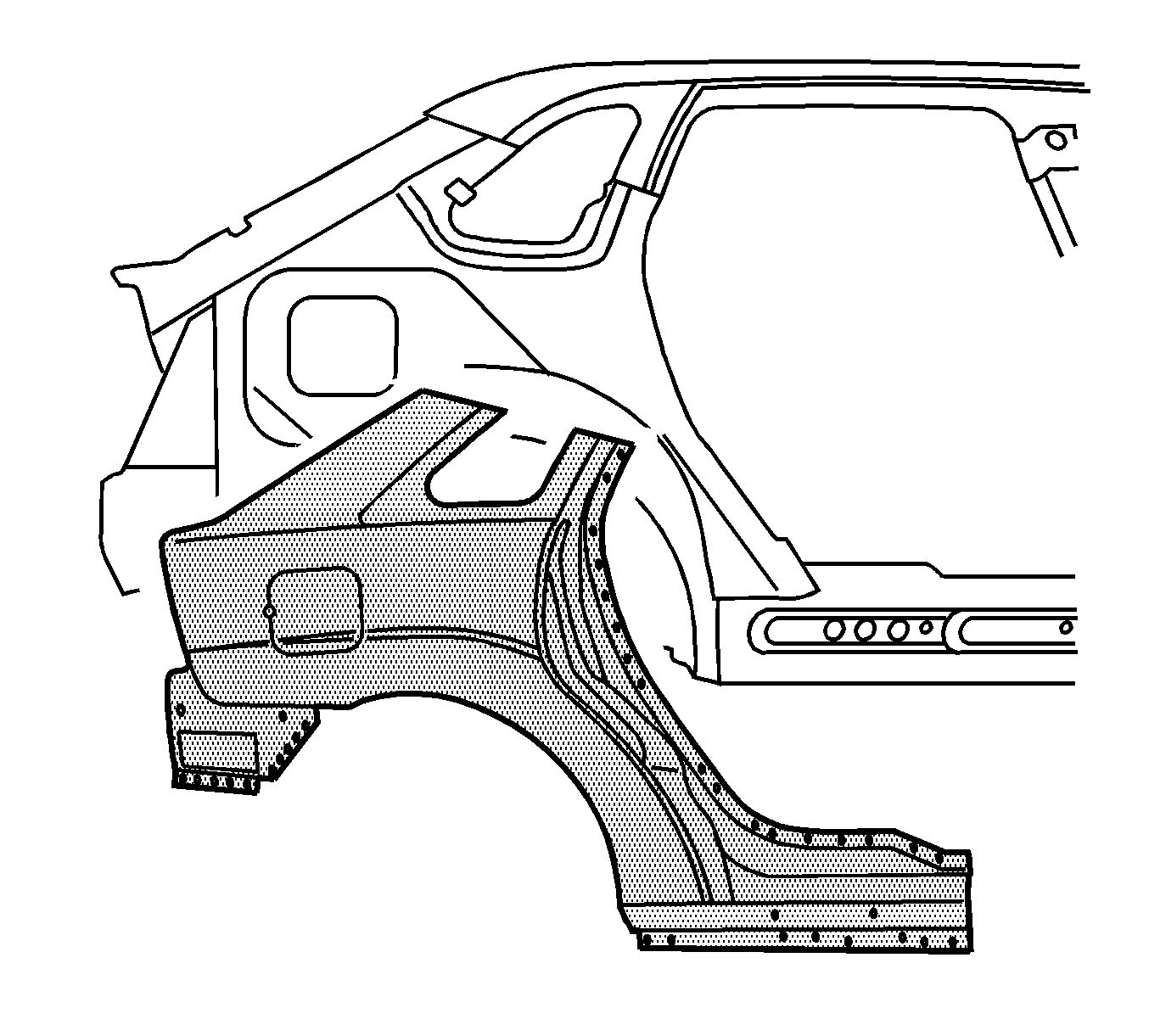
Installation Procedure (Metal-Inert Gas (MIG) Welding)
Important: To allow proper layout and cutting of the service part, review the sectioning information in the removal procedure.
- Locate the area on the service part where the sectioning will be performed.
- Measure and mark the cut line location on the service area.
- Cut the service panel at the marked locations. Trim the sectioning butt joints to allow a gap equal to the metal thickness at the sectioning joint.
- Create backing plates 50 mm (2 in) for the sail panel (a) and 100 mm (4 in) for the rocker panel (b). Create the backing plates from the unused portion of the service part.
- Trim the backing plates as necessary to fit behind the panel at the sectioning joints.
- Drill 8 mm (5/16 in) plug weld holes as necessary in locations noted from the original quarter panel.
- Prepare all mating surfaces as necessary.
- Apply 3M® Weld-Thru coating P/N 05916 or equivalent to all mating surfaces.
- Perform the sectioning procedure. Refer to Overlap/Backing Plate Sectioning .
- Plug weld accordingly.
- Stitch weld the sail panel and rocker panel accordingly.
- Clean and prepare all welded surfaces.
- Apply the sealers and anti-corrosion materials to the repair area, as necessary. Refer to Anti-Corrosion Treatment and Repair in Paint and Coatings.
- Paint the repair area. Refer to Basecoat/Clearcoat Paint Systems in Paint and Coatings.
- Install all related panels and components.
- Enable the SIR system. Refer to SIR Disabling and Enabling in SIR.
- Connect the negative battery cable. Refer to Battery Negative Cable Disconnection and Connection in Engine Electrical.

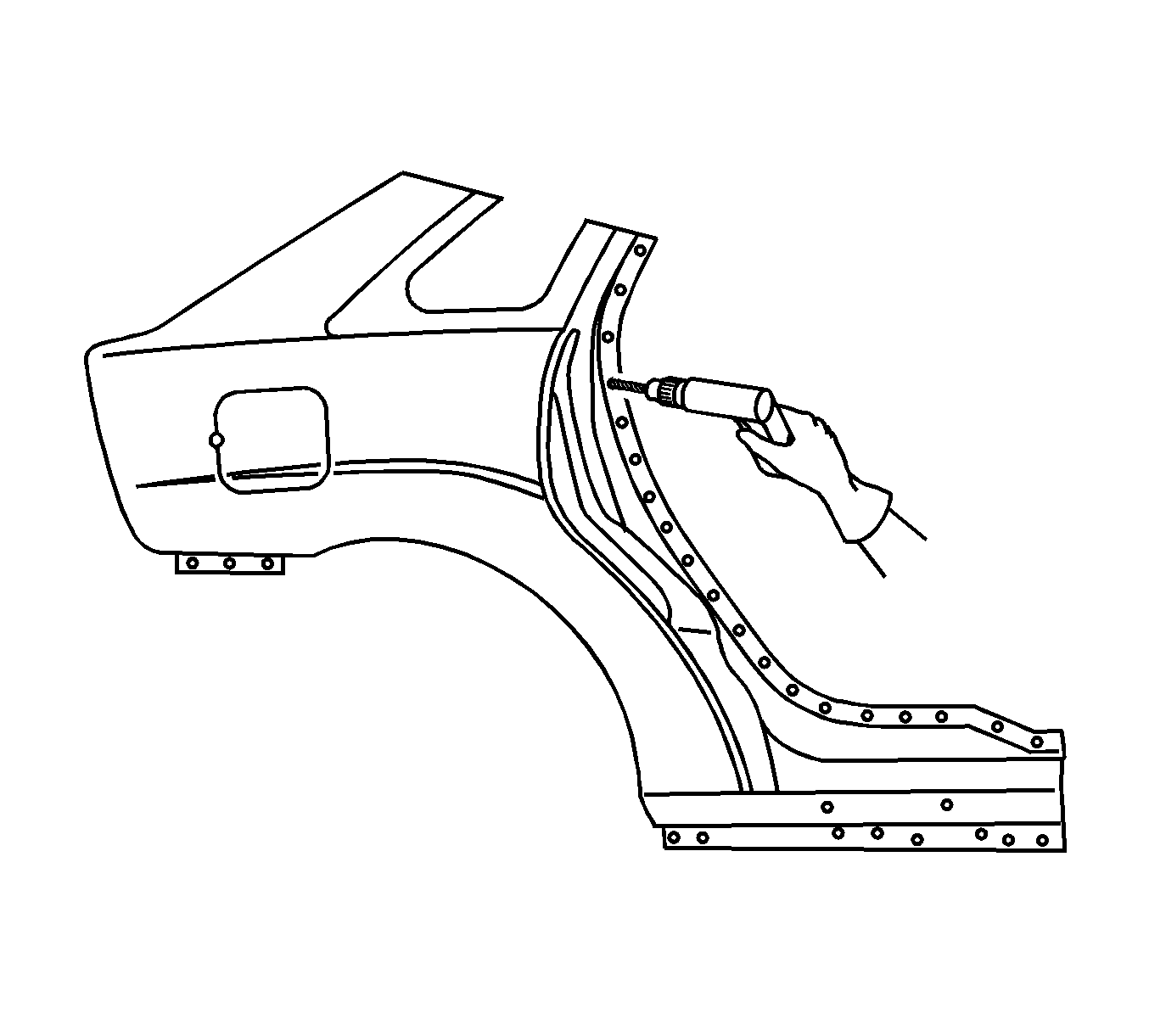
Important: If the location of the original plug weld holes can not be determined, or if structural weld-thru adhesive is present, space the plug weld holes every 40 mm (1 ½ in) apart.
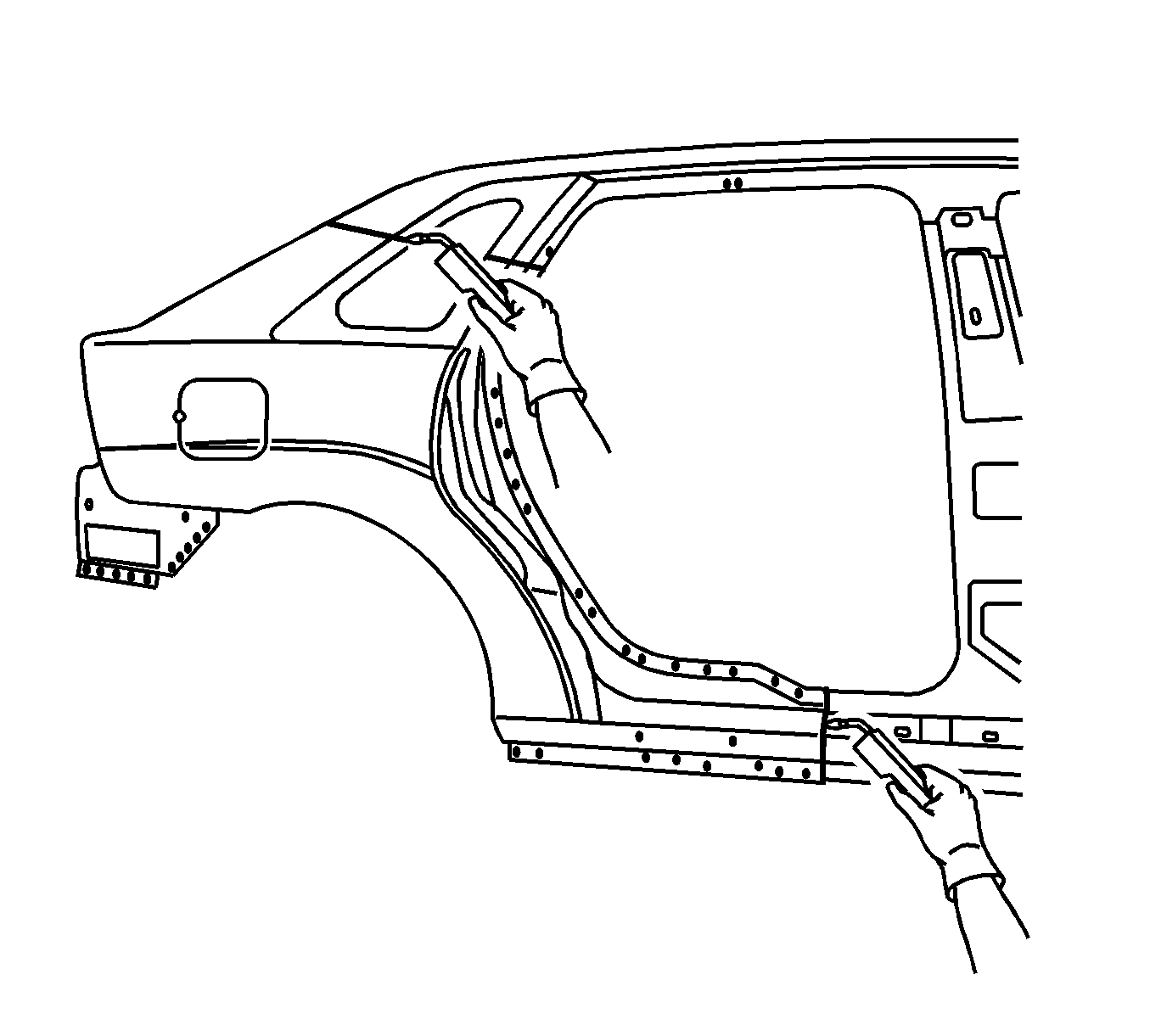
Installation Procedure (Adhesive Bonding)
- Grind the surface of the body mating flanges to bare steel.
- Grind the quarter panel mating flanges to remove the E-coating. Take care not to damage the corners or thin the metal during the grinding operation.
- Clean the mating surfaces.
- Perform the sectioning procedure. Refer to Overlap/Backing Plate Sectioning .
- Apply a 3-6 mm (1/8-1/4 in) bead of metal panel bonding adhesive GM P/N 12378566/7 (Canadian P/N 88901674/5) or equivalent, to both of the mating surfaces.
- Using a small acid brush, spread a coat of adhesive to cover all the bare metal surfaces to ensure corrosion protection.
- Install the quarter panel to the body.
- Clamp the quarter panel into position as required.
- Using lacquer thinner remove the excess adhesive from the lower quarter panel area.
- Apply the sealers and anti-corrosion materials to the repair area, as necessary. Refer to Anti-Corrosion Treatment and Repair in Paint and Coatings.
- Paint the repair area. Refer to Basecoat/Clearcoat Paint Systems in Paint and Coatings.
- Install all related panels and components.
- Enable the SIR system. Refer to SIR Disabling and Enabling in SIR.
- Connect the negative battery cable. Refer to Battery Negative Cable Disconnection and Connection in Engine Electrical.
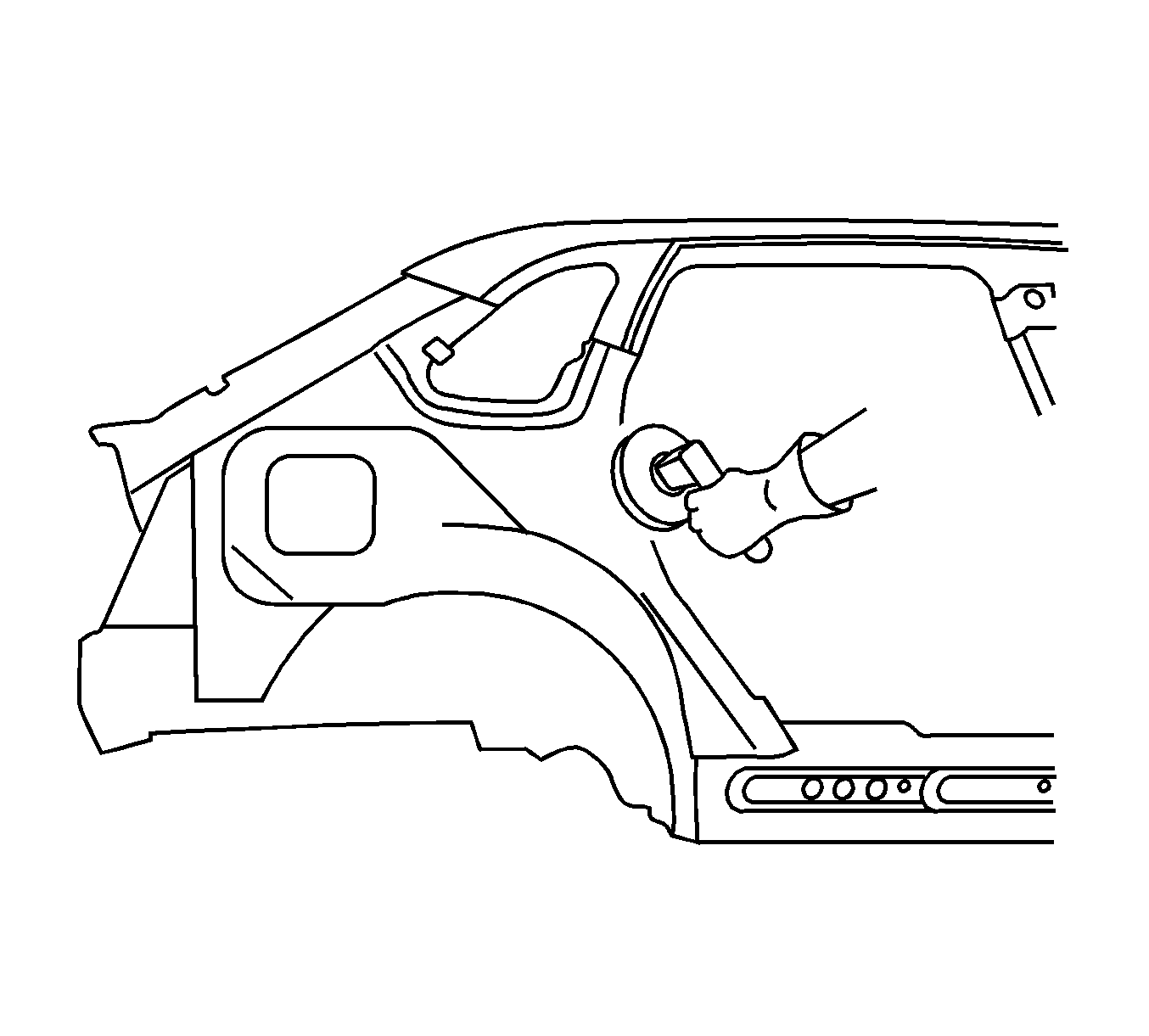
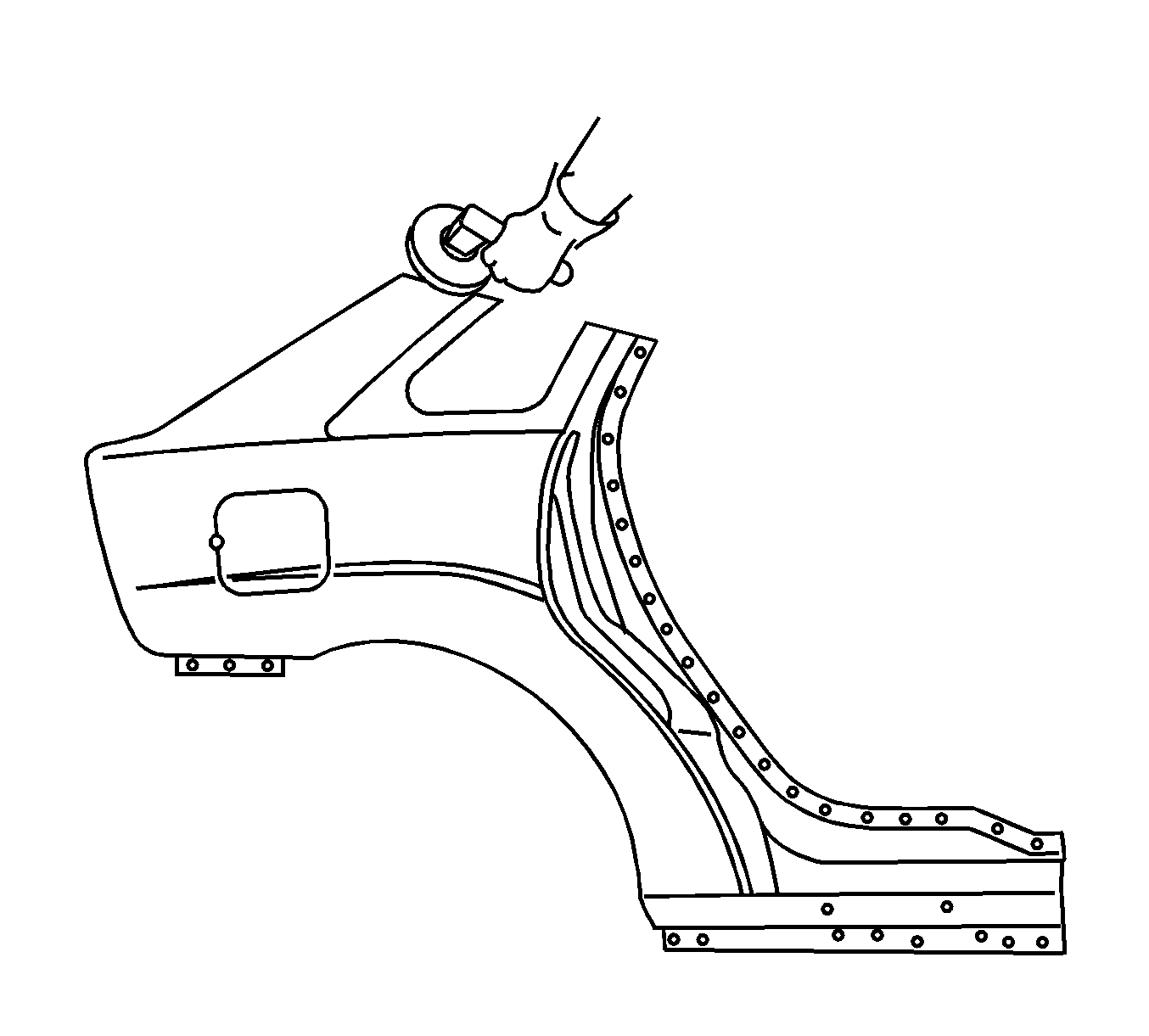
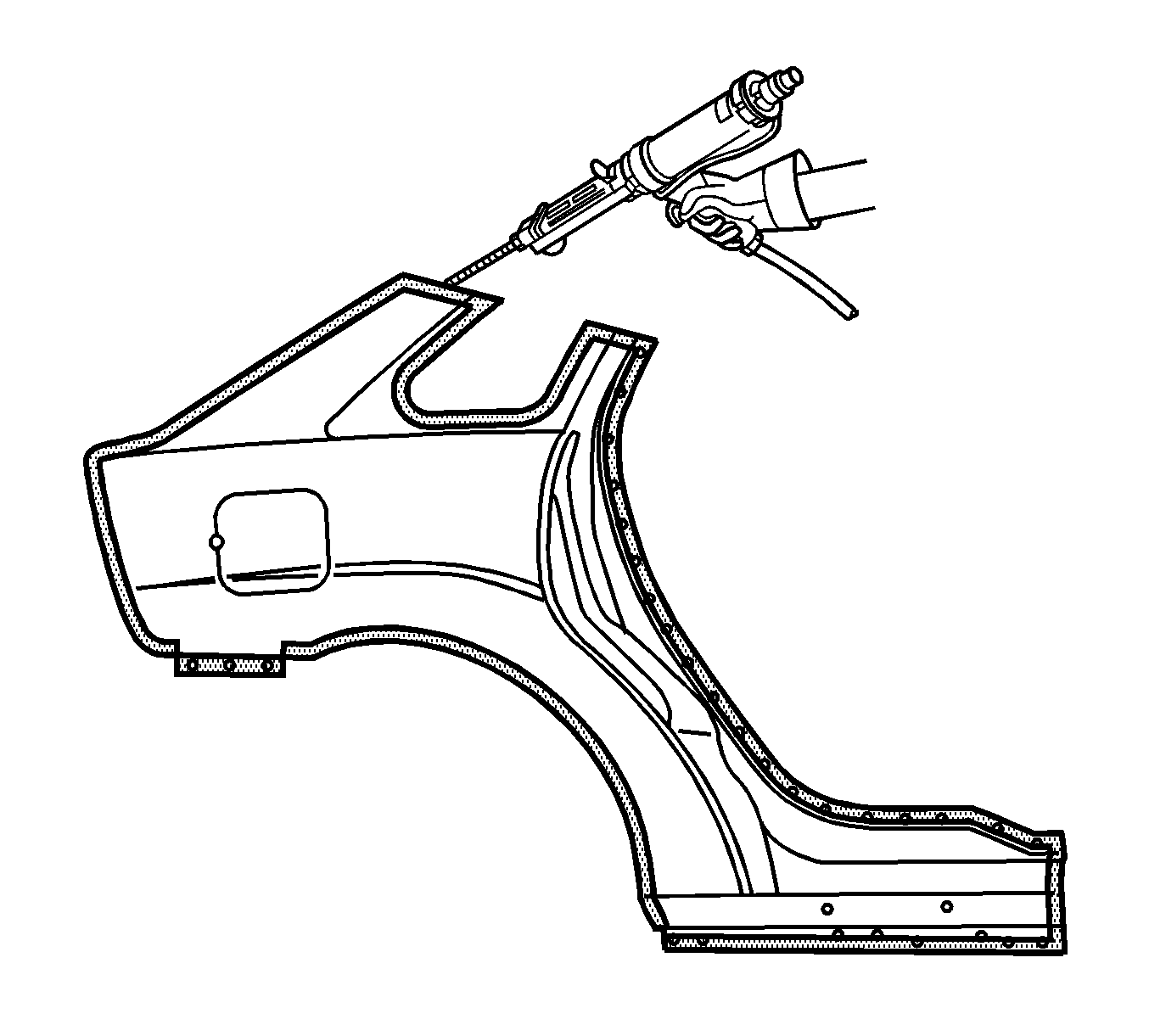
Important: The adhesive has a 40-50 minute working time. Do not allow the adhesive to totally cure off the vehicle, as proper alignment of the lower quarter panel to the body will be difficult.

Important: DO NOT pull the panels apart after joined together. Slide the panels against each other to realign the panels.
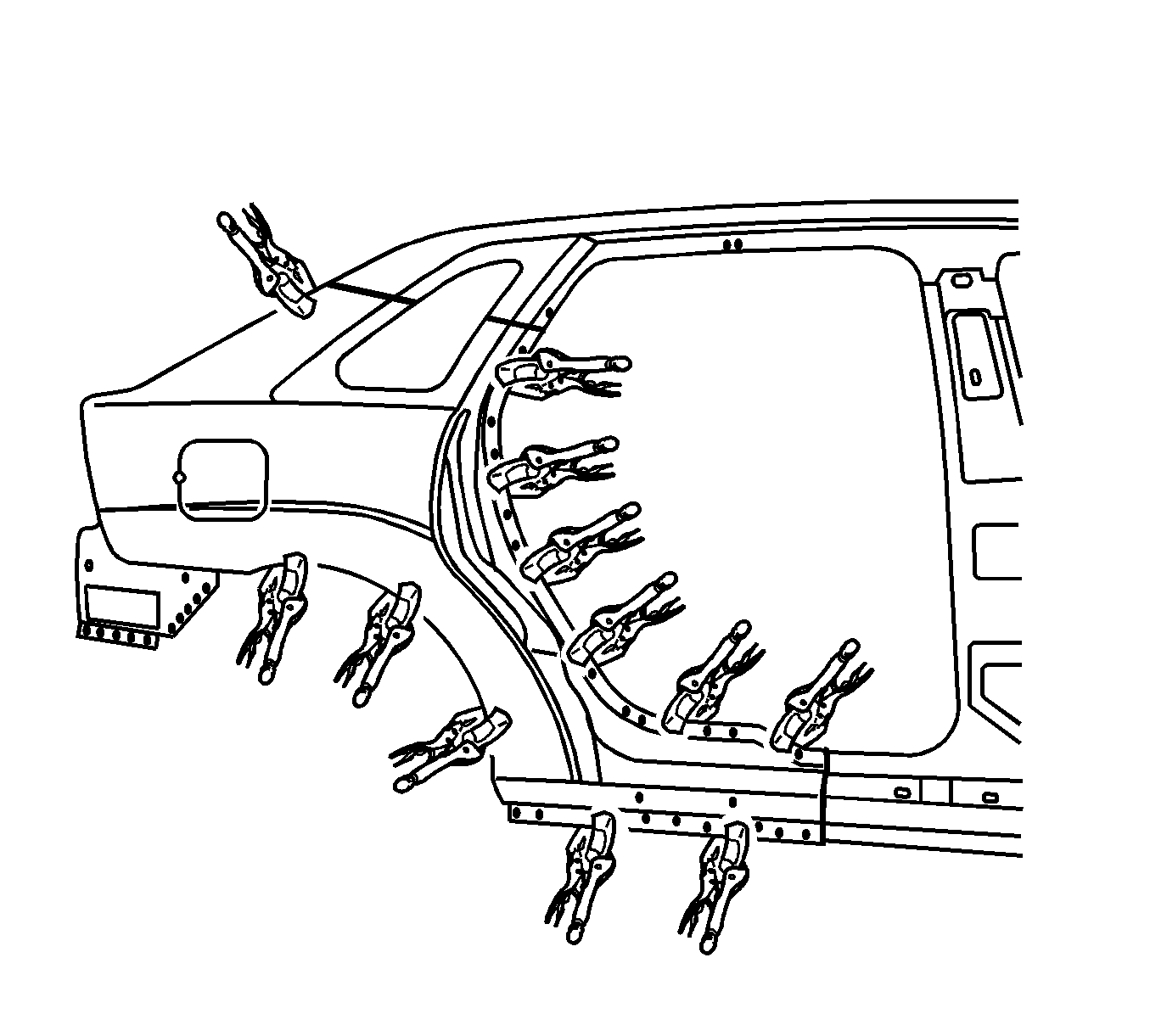
Quarter Outer Panel Sectioning SS
Description
This repair procedure gives you the option of using an installation procedure for either metal-inert gas (MIG) welding or adhesive bonding.
Removal Procedure
Caution: Refer to Approved Equipment for Collision Repair Caution in the Preface section.
Important: Before beginning the repair, refer to Metal Panel Bonding for proper adhesive preparations and general information.
- Disconnect the negative battery cable. Refer to Battery Negative Cable Disconnection and Connection .
- Disable the SIR system. Refer to SIR Disabling and Enabling .
- Restore as much of the damage as possible to factory specifications. Refer to Dimensions - Body .
- Remove all related panels and components.
- Note the location and remove the sealers and anti-corrosion materials from the repair area, as necessary. Refer to Anti-Corrosion Treatment and Repair .
- Section the sail panel (a) and the rocker panel (b).
- Locate and drill out all factory welds. Note the number and location of welds for installation of the quarter panel.
- Cut the panel at the marked locations.
- Remove the lower quarter panel.

| • | At the sail panel, measure from the back glass opening down 120 mm (4 3/4 in). Scribe a line. |
| • | At the rocker panel, measure 70 mm (2 3/4 in) rearward from the rocker panel locating hole. Scribe a line. |

Important: Do not damage any other panel or reinforcements when cutting at the marked locations.


Installation Procedure
Important: To allow proper layout and cutting of the service part, review the sectioning information in the removal procedure.
- Locate the area on the service part where the sectioning will be performed.
- Measure and mark the cut line location on the service area.
- Cut the service panel at the marked locations (a, b). Trim the sectioning butt joints to allow a gap equal to the metal thickness at the sectioning joint.
- Create backing plates 50 mm (2 in) for the sail panel and 100 mm (4 in) for the rocker panel. Create the backing plates from the unused portion of the service part.
- Trim the backing plates as necessary to fit behind the panel at the sectioning joints.
- Drill 8 mm (5/16 in) plug weld holes as necessary in locations noted from the original quarter panel.
- Prepare all mating surfaces as necessary.
- Apply GM-approved weld-thru coating or equivalent to all mating surfaces. Refer to Anti-Corrosion Treatment and Repair .
- Perform the sectioning procedure. Refer to Overlap/Backing Plate Sectioning .
- Plug weld accordingly.
- Stitch weld the sail panel and rocker panel accordingly.
- Clean and prepare all welded surfaces.
- Perform the fender flanging procedure. Refer to Wheel Opening Flanging .
- Apply the sealers and anti-corrosion materials to the repair area, as necessary. Refer to Anti-Corrosion Treatment and Repair .
- Paint the repair area. Refer to Basecoat/Clearcoat Paint Systems .
- Install all related panels and components.
- Enable the SIR system. Refer to SIR Disabling and Enabling .
- Connect the negative battery cable. Refer to Battery Negative Cable Disconnection and Connection .

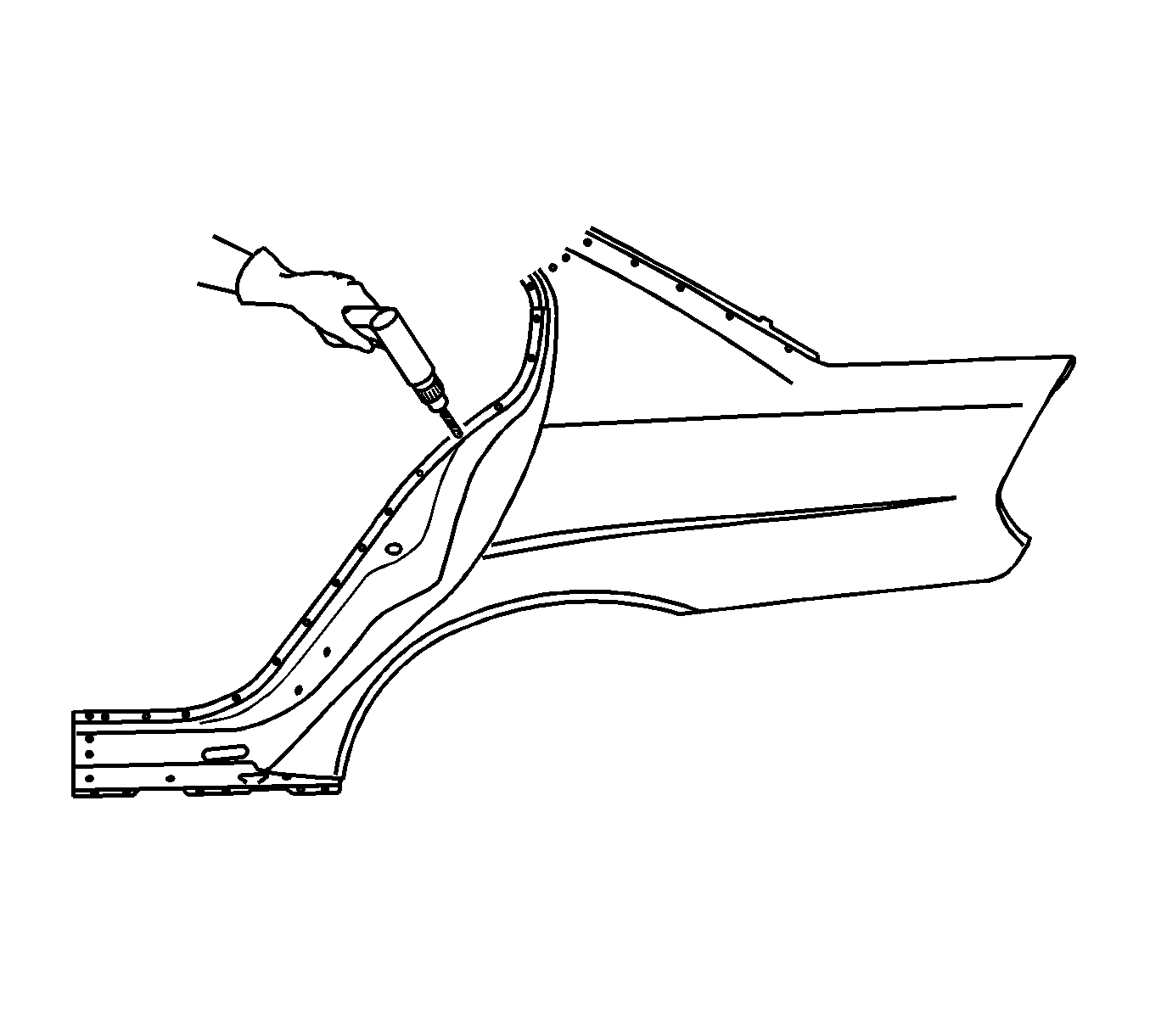
Important: If the location of the original plug weld holes can not be determined, or if structural weld-thru adhesive is present, space the plug weld holes every 40 mm (1 ½ in) apart.
